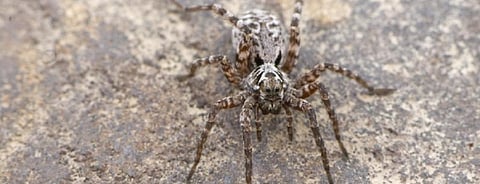

Wolf spiders in the Arctic tundra are beginning to reproduce more as a result of the warming climate, a new study has said.
A team of researchers from Aarhus University in Denmark analysed data of wolf spiders captured for 20 years by their counterparts at the Zackenberg Research Station in north-eastern Greenland.
They found that in some of the short Arctic summers, the wolf spiders produced two ‘egg sacs’ in which they carry their eggs. This behaviour although observed in warmer latitudes, had not been observed this far in the Arctic.
The researchers are concerned as to what impact will the increase in offspring of spiders have on food chains in the region in the future.
Plant last seen 136 years ago rediscovered
Researchers have rediscovered a plant that was last seen 136 years ago. The Globe andersoni is commonly known as Dancing Ladies or Swan Flower.
The researchers from Pune and Kozhikode discovered the plant in the Sevoke Hill Forest in July 2011. The area is located in northern West Bengal.
This was revealed in their paper that was recently published in international journal Botany Letters.
The plant usually grows on rocky slopes of evergreen forests.
Camels being abandoned in Odisha due to COVID-19 lockdown
Several camels have been abandoned by former owners in Odisha. Few people have visited beaches in the state ever since the nationwide lockdown to curb the spread of the novel coronavirus disease (COVID-19) was implemented.
Beach tourism in Puri, Paradip, Gopalapur and other areas in the state have been affected, with several tourists, including those within the state, cancelling their holidays.
Beaches across Odisha bear a deserted look. Several people earlier enjoyed riding camels on the beaches. Tourists are frequently offered the chance to ride camels for hours on end with little thought given to how this affects the camel’s well-being.
The lockdown, however, forced owners to leave beach areas and abandon their camels, said Ramesh Mohanty, a tour operator in Puri.
Odisha starts project to conserve Bhitarkanika fishing cats
The Odisha forest department has started a two-year conservation project for fishing cats in Bhitarkanika National Park in Kendrapara district.
The species is listed as ‘endangered’ on the International Union for Conservation of Nature’s Red List. This means it faces a high threat of extinction in the wild.
The fishing cat, however, is not a well-known species and does not enjoy the same status as crocodiles do. One purpose of conservation measures was to create awareness among people for the species, said Bikash Ranjan Dash, Divisional Forest Officer at Bhitarkanika.
The project will be funded by the department.
A new management plan to conserve fishing cats at the national park, including mapping and survey of the cat population was devised, he said. “These measures are expected to protect fishing cats in the park and its nearby areas,” Dash added.
A census to find out the exact numbers of the fishing cat — a nocturnal species that is not easy to trace — will be conducted during night-time, according to Dash. No exact ecological data on the population of the fishing cat in the park is available as of now.